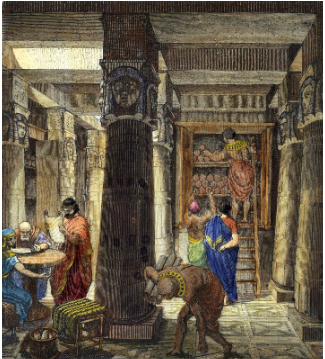The Great Library of Alexandria was one of the ancient world’s greatest centers for learning and gaining knowledge. Filled with texts and scrolls from long ago, the Library will remain a symbol of intellectual power and cultural significance. From its early stages to its tragic downfall, the Library will stand as a legendary historical feat.
The Great Library of Alexandria’s founder is still challenged to this day. It has been argued that Alexander the Great was the founder. However, many historians believe that Demetrius of Phaleron, advisor to Pharaoh Ptolemy I Soter, was charged by him with the task of founding the library. The Library was then built under the reign of Ptolemy II Philadelphus, who also obtained the Library’s first books.
At the height of the library, there are estimated to be anywhere from 40,000 to 700,000 papyrus scrolls stored according to different sources. One method used to collect books was to search ships coming into the harbor of Alexandria, and if there was a book found, it would be copied at the spot on a papyrus scroll. If the book wasn’t deemed fit for the Library, it was returned with compensation to the owner. Another way to obtain books was to buy them from different places.
The largest collection of literature in the Library by far was written in Greek. The second bulk of literature was by the Egyptians. However, it was also found that there were written works from other countries such as Babylon, Persia, and India. There was also Jewish and Buddhist literature. The literature in this library housed a vast range of literature and documents, such as records of past traditions and heritage, astronomy, philosophy, mathematics, geography, poems, law, history, science, medicine, and much more. This log of contents in the Library was done by Greek poet and scholar Callimachus, of which many consider this log to be the first library catalog made. Many scholars and researchers would live in the Library of Alexandria to do their work. However, the public could not enter without permission.
The Library of Alexandria held invaluable knowledge, but that was not enough to stop it from a tragic destruction. It is believed that there were many catastrophic events that led to its demise, rather than a single cause. The first factor of destruction, which the Library of Alexandria is infamous for, was due to fire. In Julius Caesar’s siege on Alexandria in 48 BCE, he set fire to enemy ships. Unfortunately, the fire reached the Library of Alexandria; it is unknown how much was destroyed. It’s often noted that the Library was accidentally burned, but historians continue to debate this. This was only the first fire the Library faced, however. The second, more famous, burning was by Theophilus, Patriarch of Alexandria. It is likely that Christians who moved in attacked the LIbrary, at the hand of Theophilus. Another factor of destruction was that after Julius Caesar’s siege, the Library continued to see many conquests by various powers such as the Arabs and Byzantines. Each conquest further corroded the Library through various reasons, such as neglect or damage through conflicts. The last factor in its fall was a lack of funding due to shifting interests. As different religions started to occupy the area, beliefs and world views started to change. Since the information in the Library was considered pagan, many people no longer wished to have anything to do with those books. As a result, less and less money was filtered into maintaining the Library. After suffering two fires, multiple conquests, and scarce funding, the signs of a once great library were now in shambles. It was then a shadow of everything it once was. Little was left of the Library anymore.
After years of decay and tragedy, almost nothing remains of the Great Library of Alexandria. One cannot help but mourn over the loss of countless scrolls filled with knowledge that far extended us. May we treasure the libraries we have now so that none will reach a fate as dire as that of the Great Library of Alexandria.
Sources:
https://www.mymcpl.org/blogs/historical-libraries-library-alexandria
https://www.worldhistory.org/Library_of_Alexandria/
https://www.britannica.com/topic/Library-of-Alexandria
https://www.britannica.com/topic/Library-of-Alexandria/The-fate-of-the-Library-of-Alexandria

